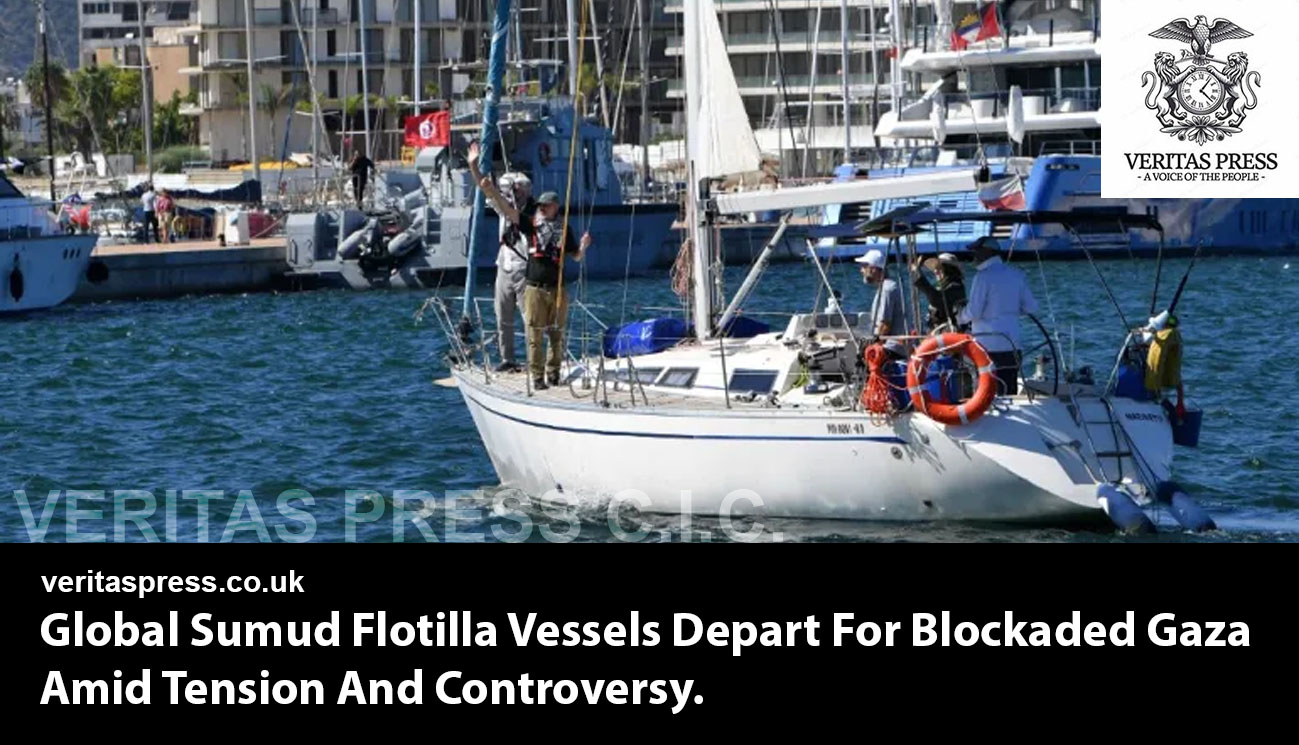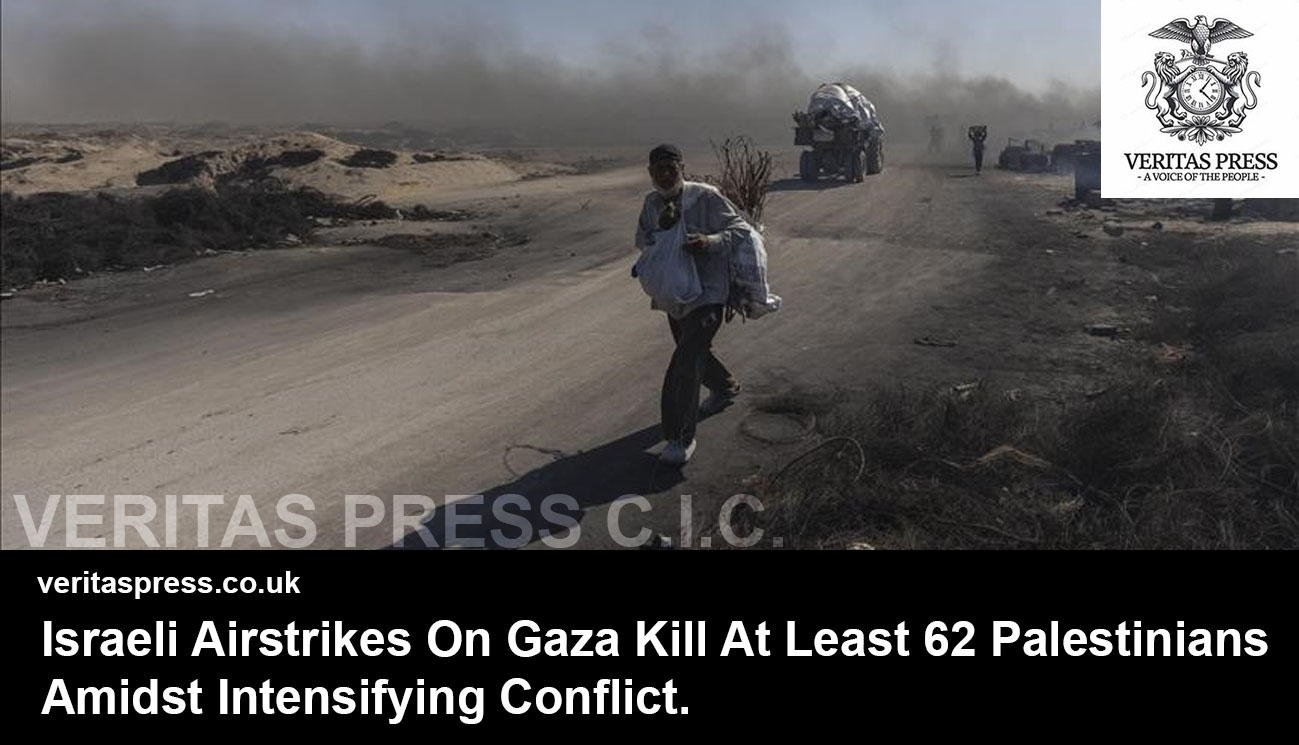Press Release: Veritas Press C.I.C.
Author: Kamran Faqir
Article Date Published: 14 Sept 2025 at 13:47 GMT
Category: Meditaerranean | Tunisia | Global Sumud Flotilla
Source(s): Veritas Press C.I.C. | Multi News Agencies
The Global Sumud Flotilla (GSF)—an international coalition of vessels carrying activists, humanitarian supplies, and prominent figures from over 40 countries-has begun its journey toward Gaza in an effort to challenge Israel’s naval blockade and deliver aid to a territory under severe humanitarian stress. Departures started this weekend from ports in Tunisia (Bizerte) and Italy (Augusta, Sicily), with other ships expected from Greece and elsewhere. The flotilla reportedly consists of nearly 50 vessels, with 500-700 activists on board.
Latest Developments:
1. Drone Attacks / Alleged Air Incidents In Tunisia:
- On 9 September, the flotilla reported that a vessel known as the Family Boat (flying the Portuguese flag) was struck by a drone while docked near Sidi Bou Said port (Tunisian waters). The boat caught fire, but there were no injuries. Activists released video footage of the incident.
- The following day, another vessel, Alma (British-flagged), was similarly hit by incendiary devices dropped from what activists say was a drone, also while docked. Again, no one was hurt.
- Tunisia’s Ministry of Interior initially denied the drone-strike claims, stating the first fire resulted from something spontaneous (a burning life jacket) or onboard fire, and that they found “no basis in truth” in the flotilla’s version. For the second incident, Tunisian authorities have described it as a “premeditated act” and say they are conducting investigations.
2. Departures From Key Ports & Composition:
- On Saturday, several boats departed from Bizerte Port (Tunisia) and Augusta Port (Sicily, Italy). From Italy, a fleet of 18 boats left after preparations.
- These are set to join up with vessels departing from Barcelona, Greece, and elsewhere, with a rendezvous at sea anticipated next week.
- Among those onboard are politicians (e.g. Arturo Scotto from Italy’s Democratic Party, MEP Annalisa Corrado), artists, parliamentarians, and public figures. A women-only vessel has also joined, with 15 activists from Europe, Latin America and Asia dedicated as a symbolic tribute to the resilience of Palestinian women.
3. Motivations & Message:
- Organisers are clear: the aim is not just aiding delivery (which is symbolic and limited given constraints) but to open a humanitarian corridor, publicly challenge the blockade, draw attention to Gaza’s ongoing humanitarian crisis (including famine risk), and increase political pressure.
- As stated in Al Jazeera, among those joining is Rima Hassan, a French-Palestinian lawmaker, who tweeted:
“Our governments are responsible for the continuation of the genocide in Gaza.”
- Another activist, Mariana Mortágua, Portuguese MP, said:
“We know who has an interest in stopping these flotillas … it’s my duty to be here … to show people that Gaza is real … people are living there and are living under attack.”
Reactions:
A. From Activists & Solidarity Groups
- Activists and the flotilla’s steering committee have condemned what they describe as intimidation efforts and attempts to derail the mission. Tara Reynor O’Grady, an Irish human rights activist, said:
“We are definitely sailing to Gaza, there is nothing that will prevent us from sailing to Gaza whatsoever … we are determined, we are clear and focused in the way we have to achieve our goal, which is to reach Gaza, break the siege and open a humanitarian sea corridor.”
- Saif Abukeshek, a Palestinian activist, emphasised the broader strategy:
“There is no one mission or campaign that will have a direct outcome impact. But I believe solidarity work is an accumulative process … We have to mobilise people around the world. We have to put pressure on governments, because that’s the only way that Israel will listen and will stop their crimes.”
B. From Tunisian Authorities:
- Tunisia’s Interior Ministry initially rejected the flotilla’s claim regarding the first drone attack, calling it “without basis”. After the second incident, they described one of the attacks as “premeditated” and pledged investigations.
C. Israel’s Position (So Far):
- As of the latest reporting, Israel has not officially commented on the specific allegations of drone attacks on flotilla vessels.
- Historically, Israel has defended its blockade on security grounds, saying it aims to prevent weapons smuggling into Gaza, and has often characterised flotilla efforts as political stunts or propaganda.
D. International / UN / Legal Observers:
- UN and human rights experts have expressed concern. Among others, Francesca Albanese, UN Special Rapporteur for the occupied Palestinian territories, warned that a confirmed drone strike would violate Tunisian sovereignty.
- Media and international NGOs are monitoring the flotilla as a legal and humanitarian test: Can civilian vessels challenge a blockade without being intercepted or subject to force? Can the mission force more robust state or international action on Gaza’s humanitarian crisis?
Legal And Ethical Issues:
- Under international humanitarian law, blockades are permitted under certain conditions, but not if they amount to collective punishment or prevent life‐saving aid. Critics argue that Gaza’s blockade and restrictions on aid access are breaching those norms. Organisers of the GSF assert that the flotilla is peaceful and civilian, aiming to assert humanitarian law.
- Questions are being raised about the legality of alleged drone strikes (if confirmed) in international or foreign territorial waters, which could implicate violations of sovereignty or international norms. Tunisia’s reaction points toward diplomatic tensions if foreign forces are proven to be involved.
Humanitarian Conditions in Gaza:
- Gaza continues to face severe humanitarian distress. Food insecurity and famine risk are cited by the UN and aid agencies. The blockade has severely restricted the flow of food, medicine, fuel, clean water, and shelter supplies.
- Death tolls from Israel’s military operations since October 2023 have reached tens of thousands (various sources), with widespread destruction of infrastructure that has exacerbated civilian suffering.
Points Of Contention / Risks:
- Safety risks: The flotilla participants face possible interception by Israeli naval forces, legal detention, or worse. The seas near Gaza are closely monitored; previous flotillas have been boarded.
- Weather and navigation risks: Already, one flotilla leg from Barcelona was delayed/returned due to stormy weather.
- Political backlash: Participants may be branded as terrorists or legal liability. Israel’s National Security Minister, Itamar Ben-Gvir, has reportedly proposed plans to treat flotilla activists as terrorists, detain them, and confiscate or repurpose their vessels.
Broader Significance:
- The GSF represents one of the boldest maritime civil society challenges to the Gaza blockade in recent years, by scale and visibility. Previous flotillas were smaller, more isolated.
- It is part of a growing global movement of solidarity, activism, and political pressure around Palestine that is leveraging legal, media, moral, civilian, and governmental levers.
Quotes:
- Greta Thunberg (from the port of Sidi Bou Said as the flotilla was greeted by supporters):
“Just across the water, there’s a genocide going on, a mass starvation by Israel’s murder machine.”
- Tara Reynor O’Grady (Irish human rights activist aboard GSF):
“We are definitely sailing to Gaza, there is nothing that will prevent us sailing to Gaza whatsoever … Don’t be distracted by the strikes … we are determined … our goal … is to reach Gaza, break the siege and open a humanitarian sea corridor.”
- Mariana Mortágua (Portuguese MP onboard):
“We know who has an interest in stopping these flotillas … it’s my duty to be here … to show people that Gaza is real … people are living there and are living under attack.”
What To Watch Next:
- Verification of drone attacks: Whether investigations in Tunisia yield concrete findings, and whether any evidence points to third-party involvement (state actors or otherwise).
- Israel’s response: Whether Israel will attempt to intercept the flotilla at sea, use legal, military, or diplomatic measures to prevent aid delivery, or make statements about the legal status of the flotilla boats and participants or label the participants as “terrorists”, preventing them entry into Gaza..
- International diplomatic pressure & legal proceedings: How states, the UN, human rights bodies, and international courts respond to both the blockade and the flotilla’s actions.
- Impact on Gaza aid flows: Whether the flotilla manages to force any change in access, even if symbolic, or influence the policies of states currently allowing or enforcing the blockade.
Conclusion:
The Global Sumud Flotilla is more than a convoy of boats; it is a civilian indictment of a world order that has allowed Gaza’s suffocation to persist for nearly two decades. Its activists are not simply ferrying sacks of flour or cartons of medicine; they are carrying an accusation against Israel for enforcing what international jurists have increasingly described as collective punishment amounting to genocide, and against the governments and institutions that have chosen complicity over accountability.
The flotilla’s very existence underscores the failure of the UN Security Council, the European Union, and Arab states to enforce even the most basic humanitarian norms. As UN experts have warned, “civil society activists would not be compelled to risk their lives at sea if the international community had acted.” That citizens must mount dangerous voyages in international waters, knowing they face drone attacks, naval interception, or indefinite detention, exposes the abdication of legal responsibility by states who continue to trade, arm, and politically shield Israel.
Israel’s threats to designate humanitarian activists as “terrorists” and detain them under harsh prison conditions illuminate the broader logic of the siege: the criminalisation of solidarity, the denial of humanitarian rights, and the assertion that any challenge to its control must be met with coercion. If confirmed, the alleged drone strikes on flotilla vessels in Tunisian waters would not only represent an attack on activists but also a violation of a sovereign state’s territory, further proof that the blockade extends beyond Gaza’s shores into the realm of lawlessness.
The question now is not only whether the flotilla will reach Gaza, but whether the international community will allow Israel to once again enforce its blockade with violence and impunity. If governments do nothing, their silence will not be neutrality; it will be complicity in the starvation of a population and the criminalisation of those who resist.
In this sense, the flotilla is not simply sailing to Gaza. It is sailing into the vacuum left by international law, into the moral void of global diplomacy, and into the heart of the question that defines this era: will the world tolerate the siege of Gaza until its people are erased, or will it finally confront the architecture of impunity that sustains it?




























Leave a Reply